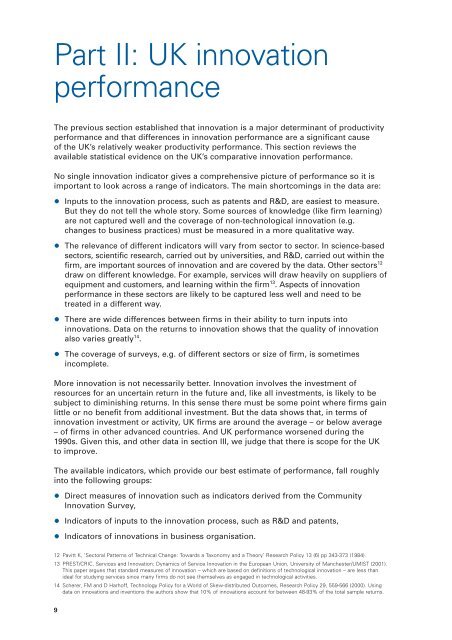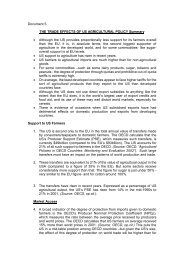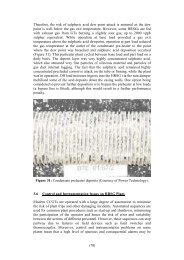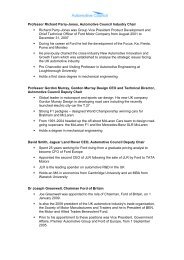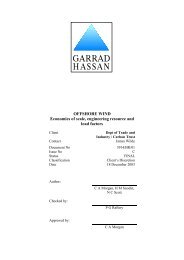Competing in the Global Economy – The Innovation Challenge
Competing in the Global Economy – The Innovation Challenge
Competing in the Global Economy – The Innovation Challenge
Create successful ePaper yourself
Turn your PDF publications into a flip-book with our unique Google optimized e-Paper software.
Part II: UK <strong>in</strong>novation<br />
performance<br />
<strong>The</strong> previous section established that <strong>in</strong>novation is a major determ<strong>in</strong>ant of productivity<br />
performance and that differences <strong>in</strong> <strong>in</strong>novation performance are a significant cause<br />
of <strong>the</strong> UK’s relatively weaker productivity performance. This section reviews <strong>the</strong><br />
available statistical evidence on <strong>the</strong> UK’s comparative <strong>in</strong>novation performance.<br />
No s<strong>in</strong>gle <strong>in</strong>novation <strong>in</strong>dicator gives a comprehensive picture of performance so it is<br />
important to look across a range of <strong>in</strong>dicators. <strong>The</strong> ma<strong>in</strong> shortcom<strong>in</strong>gs <strong>in</strong> <strong>the</strong> data are:<br />
• Inputs to <strong>the</strong> <strong>in</strong>novation process, such as patents and R&D, are easiest to measure.<br />
But <strong>the</strong>y do not tell <strong>the</strong> whole story. Some sources of knowledge (like firm learn<strong>in</strong>g)<br />
are not captured well and <strong>the</strong> coverage of non-technological <strong>in</strong>novation (e.g.<br />
changes to bus<strong>in</strong>ess practices) must be measured <strong>in</strong> a more qualitative way.<br />
• <strong>The</strong> relevance of different <strong>in</strong>dicators will vary from sector to sector. In science-based<br />
sectors, scientific research, carried out by universities, and R&D, carried out with<strong>in</strong> <strong>the</strong><br />
firm, are important sources of <strong>in</strong>novation and are covered by <strong>the</strong> data. O<strong>the</strong>r sectors 12<br />
draw on different knowledge. For example, services will draw heavily on suppliers of<br />
equipment and customers, and learn<strong>in</strong>g with<strong>in</strong> <strong>the</strong> firm 13 . Aspects of <strong>in</strong>novation<br />
performance <strong>in</strong> <strong>the</strong>se sectors are likely to be captured less well and need to be<br />
treated <strong>in</strong> a different way.<br />
• <strong>The</strong>re are wide differences between firms <strong>in</strong> <strong>the</strong>ir ability to turn <strong>in</strong>puts <strong>in</strong>to<br />
<strong>in</strong>novations. Data on <strong>the</strong> returns to <strong>in</strong>novation shows that <strong>the</strong> quality of <strong>in</strong>novation<br />
also varies greatly 14 .<br />
• <strong>The</strong> coverage of surveys, e.g. of different sectors or size of firm, is sometimes<br />
<strong>in</strong>complete.<br />
More <strong>in</strong>novation is not necessarily better. <strong>Innovation</strong> <strong>in</strong>volves <strong>the</strong> <strong>in</strong>vestment of<br />
resources for an uncerta<strong>in</strong> return <strong>in</strong> <strong>the</strong> future and, like all <strong>in</strong>vestments, is likely to be<br />
subject to dim<strong>in</strong>ish<strong>in</strong>g returns. In this sense <strong>the</strong>re must be some po<strong>in</strong>t where firms ga<strong>in</strong><br />
little or no benefit from additional <strong>in</strong>vestment. But <strong>the</strong> data shows that, <strong>in</strong> terms of<br />
<strong>in</strong>novation <strong>in</strong>vestment or activity, UK firms are around <strong>the</strong> average <strong>–</strong> or below average<br />
<strong>–</strong> of firms <strong>in</strong> o<strong>the</strong>r advanced countries. And UK performance worsened dur<strong>in</strong>g <strong>the</strong><br />
1990s. Given this, and o<strong>the</strong>r data <strong>in</strong> section III, we judge that <strong>the</strong>re is scope for <strong>the</strong> UK<br />
to improve.<br />
<strong>The</strong> available <strong>in</strong>dicators, which provide our best estimate of performance, fall roughly<br />
<strong>in</strong>to <strong>the</strong> follow<strong>in</strong>g groups:<br />
• Direct measures of <strong>in</strong>novation such as <strong>in</strong>dicators derived from <strong>the</strong> Community<br />
<strong>Innovation</strong> Survey,<br />
• Indicators of <strong>in</strong>puts to <strong>the</strong> <strong>in</strong>novation process, such as R&D and patents,<br />
• Indicators of <strong>in</strong>novations <strong>in</strong> bus<strong>in</strong>ess organisation.<br />
12 Pavitt K, ‘Sectoral Patterns of Technical Change: Towards a Taxonomy and a <strong>The</strong>ory’ Research Policy 13 (6) pp 343-373 (1984).<br />
13 PREST/CRIC, Services and <strong>Innovation</strong>: Dynamics of Service <strong>Innovation</strong> <strong>in</strong> <strong>the</strong> European Union, University of Manchester/UMIST (2001).<br />
This paper argues that standard measures of <strong>in</strong>novation <strong>–</strong> which are based on def<strong>in</strong>itions of technological <strong>in</strong>novation <strong>–</strong> are less than<br />
ideal for study<strong>in</strong>g services s<strong>in</strong>ce many firms do not see <strong>the</strong>mselves as engaged <strong>in</strong> technological activities.<br />
14 Scherer, FM and D Harhoff, Technology Policy for a World of Skew-distributed Outcomes, Research Policy 29, 559-566 (2000). Us<strong>in</strong>g<br />
data on <strong>in</strong>novations and <strong>in</strong>ventions <strong>the</strong> authors show that 10% of <strong>in</strong>novations account for between 48-93% of <strong>the</strong> total sample returns.<br />
9


